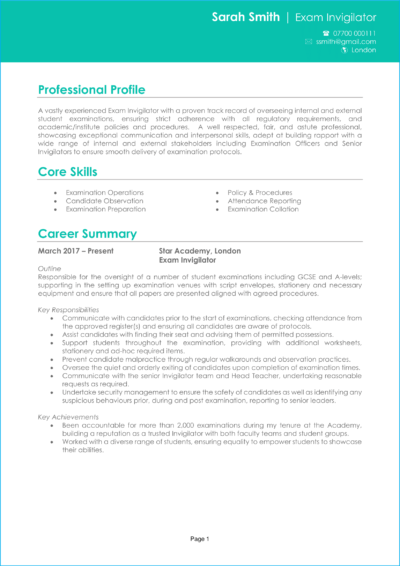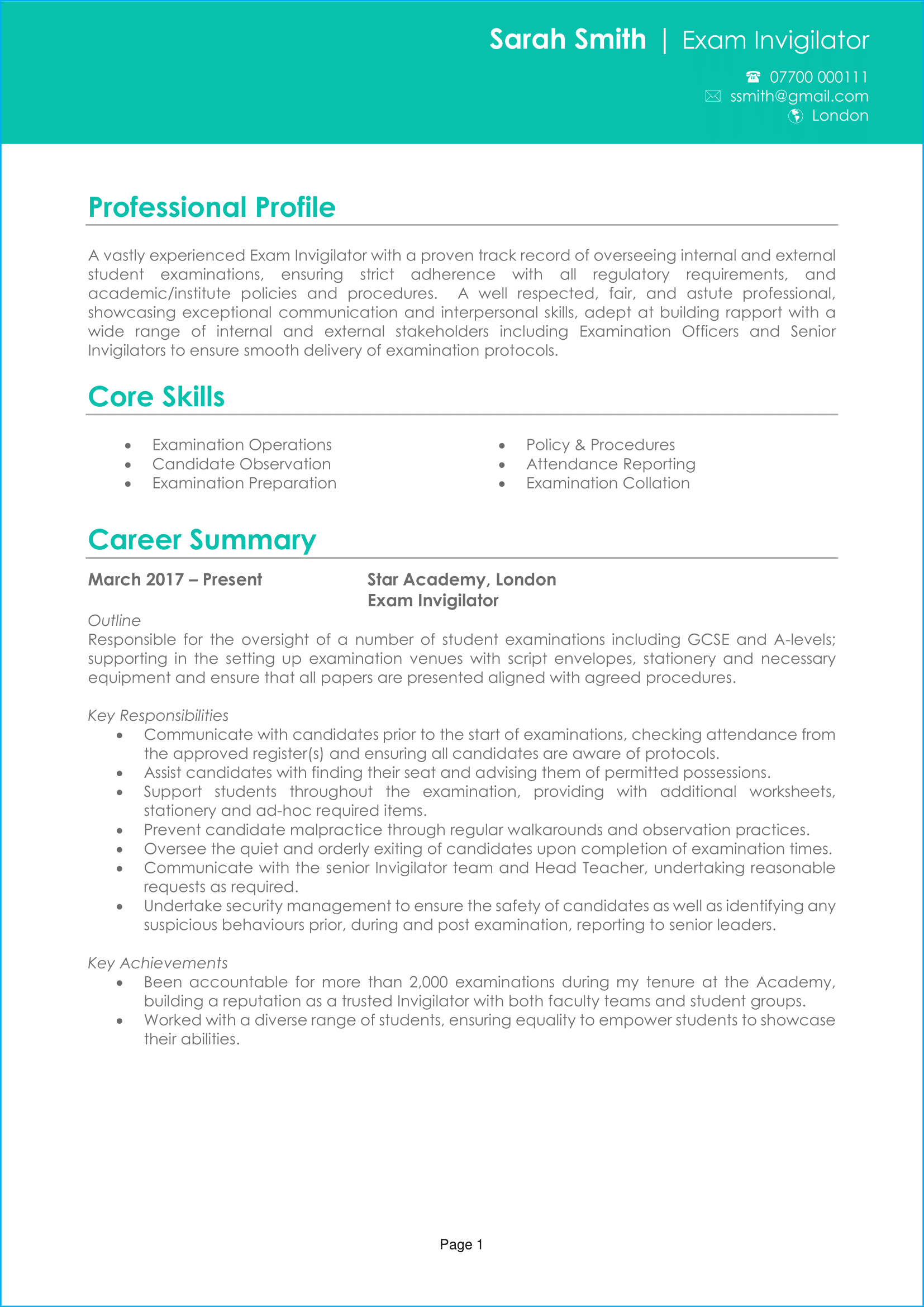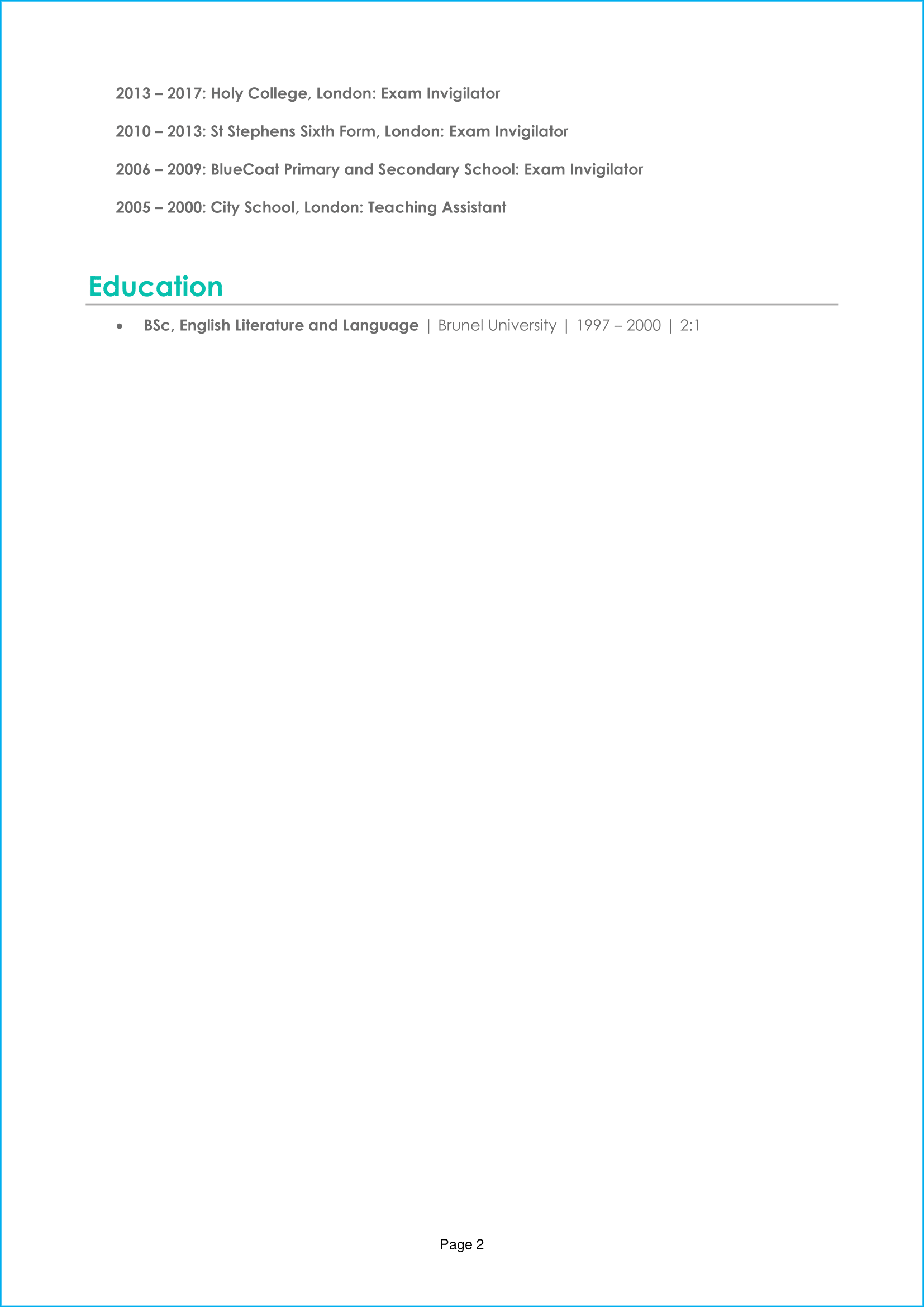Invigilators support students in some of the most crucial parts of their education, ensuring everything goes smoothly during important exams.
But if you want to secure an interview, you first need a CV that will pass the test.
For tips and advice on creating an application that will get you noticed, check out our comprehensive guide and exam invigilator CV examples below.
Contents
|
Exam Invigilator CV example
Examination Officer CV example
This is a good example of a Exam Invigilator CV which contains all of the information that a hiring manager will need to know, and presents it in a well- structured, easy-to-read manner.
Take some time to study and understand this CV, and refer to it throughout the writing of your own CV for best results.


Exam Invigilator CV layout and format
Recruiters and employers are busy, and if they can’t find the information they’re looking for in a few seconds, it could be game over for your application.
You need to format and structure your CV in a way which allows the reader to pick out your key information with ease, even if they’re strapped for time.
It should be clear, easily legible, well-organised and scannable – check out some simple tips and tricks below:
CV formatting tips
- Length: Two sides of A4 makes for the perfect CV length, though one page is okay for less experienced applicants. This forces you to make sure that every single sentence adds value to your CV and ensures you avoid waffle.
- Readability: Help out time-strapped recruiters by formatting your CV for easy reading. Using lots of bullet points and lists will help them to skim through your info, while clearly formatted headings will allow them to navigate towards the content which is most useful to them.
- Design: It’s generally best to stick to a simple CV design, as funky or elaborate designs rarely add any value to your application. A clear, modern font and a subtle colour scheme work perfectly and allow your skills, experience and achievements to speak for themselves.
- Avoid photos: Don’t add photos, images or profile photos to your CV. Not only do they take up much-needed CV space, but they’re actually completely unnecessary and won’t boost your CV at all.
Quick tip: Formatting your CV to look professional can be difficult and time-consuming when using Microsoft Word or Google Docs. If you want to create an attractive CV quickly, try our quick-and-easy CV Builder and use one of their eye-catching professional CV templates.
CV structure
When writing your own CV, break up your CV content into the following key sections:
- Name and contact details – Place them at the top of your CV, so that employers can easily get in touch.
- CV profile – A punchy sales pitch of your key experience, skills and achievements to reel readers in.
- Core skills section – A bullet-pointed snapshot of your abilities.
- Work experience – A well-structured list of your relevant work experience.
- Education – An overview of any relevant qualifications or professional training you have.
- Hobbies and interests – A short description of any relevant hobbies or interests (optional).
Now I’ll tell you exactly what you should include in each CV section.
CV Contact Details
Make it easy for recruiters to get in touch, by heading your CV with your contact details.
There’s no need for excessive details – just list the basics:
- Mobile number
- Email address – Use a professional address with no nicknames.
- Location – Just write your general location, such as ‘London’ or ‘Cardiff’ – there’s no need to put your full address.
- LinkedIn profile or portfolio URL
Exam Invigilator CV Profile
Your CV profile (or personal statement, if you’re an entry-level applicant) provides a brief overview of your skills, abilities and suitability for a position.
It’s ideal for busy recruiters and hiring managers, who don’t want to waste time reading unsuitable applications.
Think of it as your personal sales pitch. You’ve got just a few lines to sell yourself and prove you’re a great match for the job – make it count!
Tips for creating an strong CV profile:
- Keep it concise: When it comes to CV profile length, less is more, as recruiters are often time-strapped. Aim for around of 3-5 persuasive lines.
- Tailor it: The biggest CV mistake? A generic, mass-produced document which is sent out to tens of employers. If you want to land an interview, you need to tailor your CV profile (and your application as a whole) to the specific roles you’re applying for. So, before you start writing, remember to read over those job descriptions and make a list of the skills, knowledge and experience the employers are looking for.
- Don’t add an objective: Avoid discussing your career goals in your CV profile – if you think they’re necessary, briefly mention them in your cover letter instead.
- Avoid cliches: Clichés like “blue-sky thinker with a go-getter attitude” might sound impressive to you, but they don’t actually tell the recruiter much about you. Concentrate on highlighting hard facts and skills, as recruiters are more likely to take these on board.
Example CV profile for Exam Invigilator
What to include in your Exam Invigilator CV profile?
- Summary of experience: Recruiters will want to know what type of companies you’ve worked for, industries you have knowledge of, and the type of work you’ve carried out in the past, so give them a summary of this in your profile.
- Relevant skills: Make your most relevant Exam Invigilator key skills clear in your profile. These should be tailored to the specific role you’re applying for – so make sure to check the job description first, and aim to match their requirements as closely as you can.
- Essential qualifications: Be sure to outline your relevant Exam Invigilator qualifications, so that anyone reading the CV can instantly see you are qualified for the jobs you are applying to.
Quick tip: Struggling to write a powerful profile? Choose from hundreds of pre-written profiles across all industries, and add one to your CV with one click in our quick-and-easy CV Builder. All written by recruitment experts and easily tailored to suit your unique skillset.
Core skills section
Underneath your profile, write a core skills section to make your most relevant skills jump off the page at readers.
It should be made up of 2-3 columns of bullet points of your relevant skills.
Before you do this, look over the job description and make a list of any specific skills, specialisms or knowledge required.
Then, make sure to use your findings in your list. This will paint you as the perfect match for the role.
Top skills for your Exam Invigilator CV
Examination operations – ensuring exams are executed as per agreed procedures and in line with examination guidelines.
Candidate observation – observing candidates to prevent malpractice such as chatting, passing notes etc.
Examination preparation – ensuring all candidates have everything required for their exam.
Attendance reporting – keeping an accurate log of all candidates in attendance.
Examination collation – collecting examination scripts and ensuring they are passed on to the examination board in sealed envelopes with no opportunity for tampering.
Quick tip: Our quick-and-easy CV Builder contains thousands of in-demand skills for every profession that can be added to your CV in seconds – saving you time and greatly improving your chances of landing job interviews.


Work experience/Career history
Next up is your work experience section, which is normally the longest part of your CV.
Start with your current (or most recent) job and work your way backwards through your experience.
Can’t fit all your roles? Allow more space for your recent career history and shorten down descriptions for your older roles.
Structuring your roles
The structure of your work experience section can seriously affect its impact.
This is generally the biggest section of a CV, and with no thought to structure, it can look bulky and important information can get lost.
Use my 3-step structure below to allow for easy navigation, so employers can find what they are looking for:
Outline
Start with a solid introduction to your role as a whole, in order to build some context.
Explain the nature of the organisation you worked for, the size of the team you were part of, who you reported to and what the overarching purpose of your job was.
Key responsibilities
Use bullet points to detail the key responsibilities of your role, highlighting hard skills, software and knowledge wherever you can.
Keep them short and sharp to make them easily digestible by readers.
Key achievements
Round up each role by listing 1-3 key achievements, accomplishments or results.
Wherever possible, quantify them using hard facts and figures, as this really helps to prove your value.
Example job for Exam Invigilator CV
Outline
Responsible for the oversight of several student examinations including GCSE and A-levels; supporting in the setting up of examination venues and script envelopes, stationary and necessary equipment, and ensuring all papers are presented aligned with agreed procedures.
Key Responsibilities
- Communicate with candidates prior to the start of examinations, checking attendance from approved registers and ensuring all candidates are aware of protocols
- Assist candidates with finding their seat and advising them of permitted permissions
- Support students throughout the examination, providing additional worksheets, stationary and ad hoc required items
- Prevent candidate malpractice through regular walkarounds and observation practices
Quick tip: Create impressive job descriptions easily in our quick-and-easy CV Builder by adding pre-written job phrases for every industry and career stage.
Education section
Next up, you should list your education and qualifications.
This can include your formal qualifications (a degree, A-Levels and GCSEs), as well as sector-specific Exam Invigilator qualifications and/or training.
While school leavers and recent grads should include a lot of detail here to make up for the lack of work experience, experienced candidates may benefit from a shorter education section, as your work experience section will be more important to recruiters.
Interests and hobbies
The hobbies and interests CV section isn’t mandatory, so don’t worry if you’re out of room by this point.
However, if you have an interesting hobby, or an interest that could make you seem more suitable for the role, then certainly think about adding.
Be careful what you include though… Only consider hobbies that exhibit skills that are required for roles as a Exam Invigilator, or transferable workplace skills.
There is never any need to tell employers that you like to watch TV and eat out.


Writing your Exam Invigilator CV
An interview-winning CV for a Exam Invigilator role, needs to be both visually pleasing and packed with targeted content.
Whilst it needs to detail your experience, accomplishments and relevant skills, it also needs to be as clear and easy to read as possible.
Remember to research the role and review the job ad before applying, so you’re able to match yourself up to the requirements.
If you follow these guidelines and keep motivated in your job search, you should land an interview in no time.
Best of luck with your next application!













